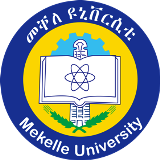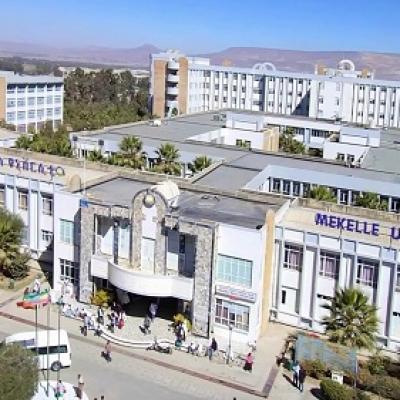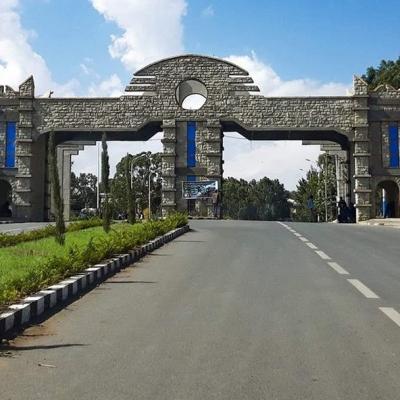History of Mekelle University
Mekelle University is found at the town of Mekelle in Tigray region of Northern Ethiopia, at a distance of 783 Kilometers from the Ethiopian capital. The merger the two former colleges: Mekelle Business College and Mekelle University College established the University in May, 2000 by the Government of Ethiopia (Council of Ministers, Regulations No. 61/1999 of Article 3) as an autonomous higher education institution. The two colleges have their own historical developments after beginning from scratch, and have also experienced exhausting ascends and descends, with voluminous relocations from place to place.
Mekelle Business College
Mekelle Business College was first established as a school of Economics in 1987 by the Ethiopian Peoples Revolutionary Democratic Front (EPRDF) in one of the then liberated areas of Tigray- Dejena (in Western Tigray). The main objective of the school was to train middle-level experts who could assume the financial and administrative responsibilities of the public in the then liberated areas during the armed struggle. After the downfall of the Derg regime, the School assessed the demand in the different parts of the country and designed a new curriculum to meet the demand. And in 1991, the school was upgraded to a college offering diploma level programs and renamed as Mekelle Business College, marking the establishment of the first higher institution in Tigray at the very end of the last decade of the 20th century.
During the first few years, there was no infrastructure- such as buildings, furniture and other necessities for the establishment of such a college. The government found a solution when it decided to use the political training center of the previous government as a campus for the new college. Regardless of the challenges it faced, the college started a diploma program in October 1991. At the beginning the intake capacity of the college was 150 students. It began with 16 academic staff and about 20 administrative staff members. At the end of the first year, the college received a full accreditation by the Ministry of Education. Since then, the college has been continuously expanding its programs and building its capacity.
Mekelle University College
Mekelle University College was incepted in 1993 as the Arid Zone Agricultural College which had been recited in Mekelle after a series of relocations. During the former regime, the College was originally intended to be located near Selekleka, in northwestern Tigray. But, due to many reasons, it was first established at Asmara University as a faculty, but was then moved to Agarfa, in southern Ethiopia, when the Dergue displaced Asmara University in 1990 due to the then political instability. In 1991, after some years, Asmara University retuned to Asmara and the Arid Zone Agricultural Faculty moved temporarily to Alemaya University. In 1993, the Arid Zone Agricultural College was again relocated, this time to Mekelle. As the College of Dryland Agriculture and Natural Resources Management, and permanently settled at the Endayesus Campus, which had been a military barrack since the time of Emperor Menelik.
With all the challenges it faced, the Arid Zone Agricultural College started with three degree programs and 42 students in 1993. After two years, the Faculty of Science and Technology was established at the same campus and, together, these two faculties were then upgraded to Mekelle University College. Side by side the Law Faculty then began by accepting diploma students in the continuing education program.
Towards a University
The quality, standard and relevance of education, research and consultancy services delivered by both colleges to the society enabled the two Colleges to become very popular in the country and abroad in short period of time.
Even though the managements of the two colleges were officially independent, initiatives were taken by both institutions to work closely, with a vision of creating a full-fledged University. Having a common Board of Governors played a significant role for the establishment of Mekelle University and then to achieve rapid growth after its official inauguration in May, 2000. It is now one of Ethiopia’s Centers of Excellence in Research and Education with colleges of diversified fields of areas situated in the different parts of Mekelle and the surroundings. At present, the University has seven colleges: Business and Economics, Dryland Agriculture and Natural Resources, Law and Governance, Social Sciences and Languages, Veterinary Medicine, Natural and Computational Sciences and Health Sciences. It has also eleven institutes: Institute of Pedagogical Sciences, Institute of Paleo-environment and Heritage Conservation, Ethiopian Institute of Technology-Mekelle, Institute of Water and Environment, Institute of Climate and Society, Institute of Gender, Institute of Population, Institute of Environment and Development Studies, Institute of Geo-Information and Earth Observation Sciences, Institute of Mountain Research, and Institute of Energy.
Currently, MU hosts over 31,000 students in the regular, continuing education program and summer, evening, distance education and in-service programs in both undergraduate and graduate programs.
Mekelle University is thus now a government-funded higher institution with an international reputation for teaching and research; and has collaborative understanding with national and international sister institutions. Since its establishment, it has proved to be one of the fastest growing Universities in Ethiopia. The fundamental elements of the University's mission are teaching, research and consultancy. Thus, its ultimate goal is to pursue standards of excellence in teaching, research and community service for the betterment of the society.


